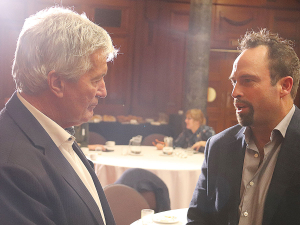Editorial: RMA reforms uproar
OPINION: The euphoria over the Government’s two new bills to replace the broken Resource Management Act is over.
 Former Ag Minister Damien O’Connor and Federated Farmers board member Richard McIntyre at Parliament.
Former Ag Minister Damien O’Connor and Federated Farmers board member Richard McIntyre at Parliament.
Federated Farmers have reiterated their support for the coalition Government to abolish the present ban on the live export of animals.
Board member and dairy farmer Richard McIntyre says they support the reintroduction of live exports, with the proviso that the welfare of the animals can be assured. His comments came after he attended a recent function at Parliament, following the presentation of a 50,000-signature petition by animal welfare lobbyists to keep the ban.
The function was hosted by former agriculture minister Damien O'Connor and Green MP Steve Abel, along with Dr John Hellstrom, who organised the petition. There was also a wide range of animal welfare groups represented, including the SPCA and three overseas experts on the subject.
These included Australian 'whistle-blower' veterinarian Dr Lynn Simpson who worked for ten years as a vet on ships carrying sheep and cattle from Australia to a range of destinations around the world. At Parliament she gave a graphic presentation showing photographs of some of the conditions she encountered. "Hell on the high seas, floating ovens and coffins" was how she described it.
"No voyage was a good voyage and there was no gold standard," she says.
McIntyre, who sat through the presentation, noted that most of the ships were out of Australia, but he agreed that if the same things had happened on an NZ ship, they would have looked more closely at the situation. He says he's spoken to NZ vets who have been on such voyages and who have told him the care of animals has been good.
McIntyre says the frustration that Feds had with the previous government was that they introduced the ban on live exports without investigating ways to improve the care of animals on such trips and meeting the concerns of the animal welfare lobby. He says they also failed to consult properly and instead just slapped on the ban. "We are pleased that this Government is having a really good look at it and seeing what can be done to improve the practice and therefore alleviate animal welfare concerns," he told Dairy News.
McIntyre says some of the images shown by Simpson were of injuries suffered by animals on the voyages, but he says injuries like these can occur on any farm at any time. However, many of injuries shown by Simpson featured animals living in their own excrement.
"None of us who saw those photos would find that acceptable. We all care about animal welfare, we don't want to be sending our animals away to suffer."
Credible Critic
Dr Lynn Simpson is arguably one of the more credible critics of the live export trade. She made her first trip as a vet on a livestock carrier in 2001 and went on to complete a total of 57 trips going to all parts of the world including the Middle East, Turkey, Libya, Egypt and Russia.
Right from her first trip, just after graduating as a vet, she voiced her concerns about what she was seeing. She says while you have these concerns, they soon disappear when you arrive at the destination, have a shower, change into clean clothes and fly back home. Simpson says at that point you have no control of the animals you have looked after on the trip.
But the reality of working daily on a livestock carrier was a long way from what the average vet encounters at their practice.
"It was the veterinarian's equivalent of being in a war zone. Trying to treat injured and stressed animals in appalling conditions where many lived their daily lives in rivers of excrement and hot conditions. In many cases it was impossible to treat them - I regularly had to euthanise them," she says.
But if the voyages were bad, worse was to come for Lynn Simpson when she was asked by the Australian government to work for them and write a report on what she saw, with a view to the government setting new welfare standards for live exports. Her report, just like her presentation, showed confronting images of life on board a livestock carrier and the government officials were not happy - especially when her report was leaked to the media worldwide.
"It was just like I out a venomous snake on their desk," she told Dairy News.
Following that she says she was vilified by the Australian government and the live export sector, suffered death threats and was blacklisted by the industry, which led to health problems. She is medically retired and suffers from PTSD as a result of what she describes as her very public career assassination.
Recent weather events in the Bay of Plenty, Gisborne/Tairawhiti, and Canterbury have been declared a medium-scale adverse event.
DairyNZ's chief executive Campbell Parker says the 2024/25 dairy season reinforces the importance of the dairy sector to New Zealand.
A New Zealand agribusiness helping to turn a long-standing animal welfare and waste issue into a high-value protein stream has won the Australian dairy sector's top innovator award.
OPINION: A bumper season all around.
Dairy Women's Network (DWN) has announced that Taranaki dairy farmer Nicola Bryant will join its Trust Board as an Associate Trustee.
Rural Women New Zealand (RWNZ) says it welcomes the release of a new report into pay equity.
OPINION: Staying with politics, with less than nine months to go before the general elections, there’s confusion in the Labour…
OPINION: Winston Peters' tirade against the free trade deal stitched with India may not be all political posturing by the…